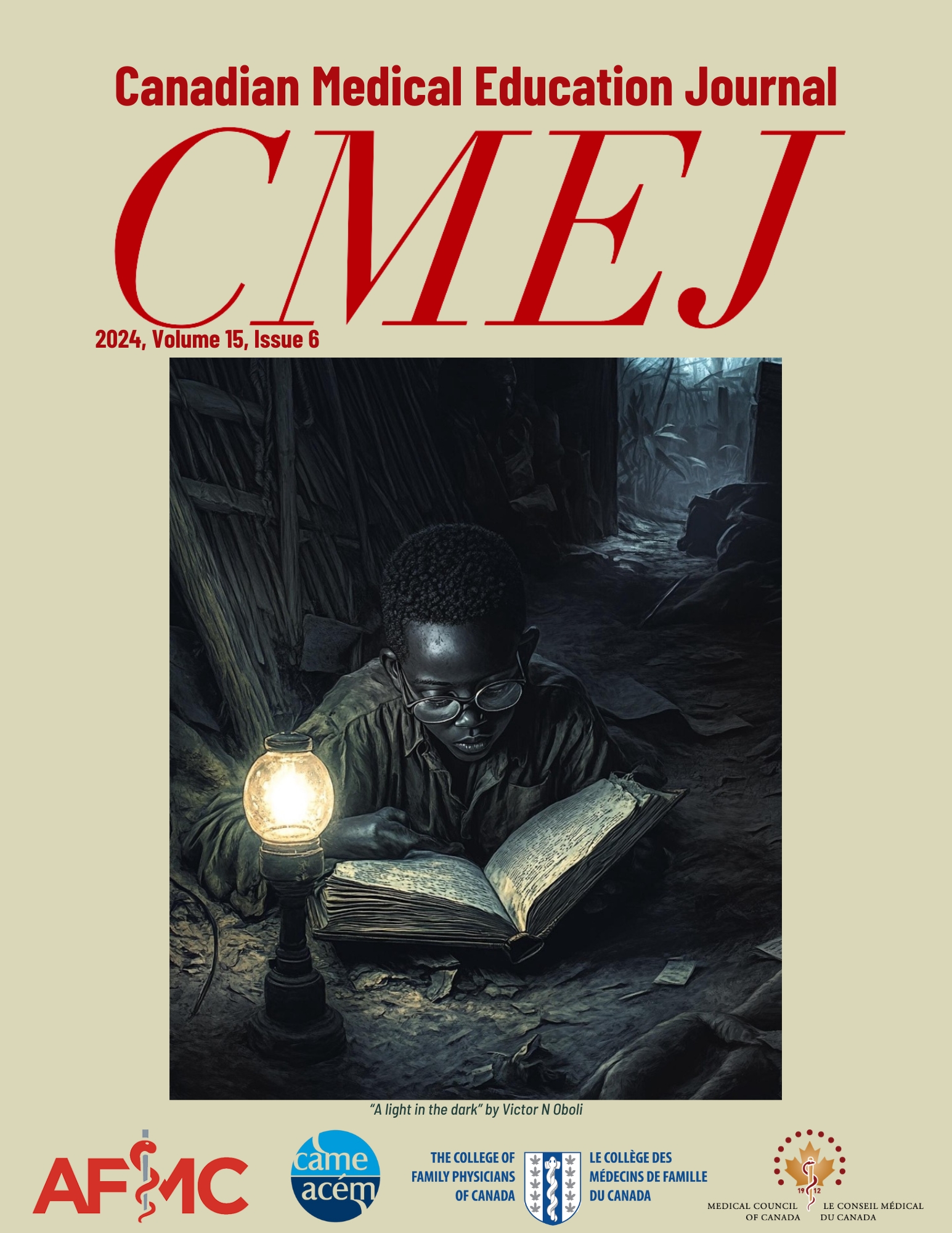Perceived effect of a training activity for medical students in community organizations
DOI:
https://doi.org/10.36834/cmej.76842Abstract
Background: Community service-learning activities (CSL) have been integrated into medical schools for several years. However, little data exists to understand the impact of this type of activity on students and communities. The purpose of this research was to explore the effect of a mandatory community-based training activity offered to medical students.
Methods: A descriptive qualitative study was conducted with students and their host community organizations. Semi-structured interviews were conducted with 1st and 2nd year medical students who participated in CSL activities (pre n = 21, post n = 7). These interviews were conducted before and after the CSL activities. In addition, focused focus groups with leaders of community organizations (n = 17) involved in student training completed the study.
Results: Experiences in a variety of socio-economic and cultural settings contributed to students' understanding of the concept of social vulnerability. CSL also generated a better understanding of the importance of community organizations in helping these vulnerable individuals.
Conclusion: In the context of CSL, a better understanding of the individual and community organization factors that contribute to the development of competencies related to practice in a context of vulnerability is necessary to allow for a significant and often transformative experience for future physicians.
Downloads
References
Smith L, Martin H, Hardison L, Bird J, others. Seifer SD and Connors K., Eds. Community campus partnerships for health. faculty toolkit for service-learning in higher education. Scotts Valley, CA: National Service-Learning Clearinghouse, 2007. 2007; Disponible à: https://pdfs.semanticscholar.org/44c1/f151ad466b3fe8609394cc77d6dc0a7c2126.pdf
George-Paschal L, Hawkins A, Graybeal L. Investigating the overlapping experiences and impacts of service-learning: juxtaposing perspectives of students, faculty, and community partners. Mich J Comm Serv Learn. 2019;25(2):43-61. https://doi.org/10.3998/mjcsloa.3239521.0025.203 DOI: https://doi.org/10.3998/mjcsloa.3239521.0025.203
Hasbún B, Miño C, Cárdenas C, Cisternas O, Fara C, Garcia F. Service-learning as a means to promote development of social responsibility competency in a department of economics and business (English translation). Intern J Res Serv-Learn Comm Engag. 2016 Dec 22;4(1). https://doi.org/10.37333/001c.29618 DOI: https://doi.org/10.37333/001c.29618
Mihan A, Muldoon L, Leider H et al. (2022). Social accountability in undergraduate medical education: a narrative review. Educfor Health. 2022;35(1), 3-8. https://doi.org/10.4103/efh.efh_305_21 DOI: https://doi.org/10.4103/efh.efh_305_21
Truong J, Sandhu P, Sheng V. et al. Advocacy in community-based service learning: perspectives of community partner organizations. Can Med Educ J. 2023;14(1), 90-94. https://doi.org/10.36834/cmej.74887 DOI: https://doi.org/10.36834/cmej.74887
Dankner R, Gabbay U, Leibovici L, Sadeh M, Sadetzki S. Implementation of a competency-based medical education approach in public health and epidemiology training of medical students. Isr J Health Policy Res. 2018 Feb 20;7(1):13. https://doi.org/10.1186/s13584-017-0194-8 DOI: https://doi.org/10.1186/s13584-017-0194-8
Bandura A. Social foundations of thought and action: a social cognitive theory. Englewood Cliffs, NJ, US: Prentice-Hall, Inc; 1986. xiii, 617 p. (Social foundations of thought and action: A social cognitive theory).
Van Melle E, Gruppen L, Holmboe ES, et al. Using contribution analysis to evaluate competency-based medical education programs: it's all about rigor in thinking. Acad Med. 2017 Jun;92(6):752-8. https://doi.org/10.1097/ACM.0000000000001479 DOI: https://doi.org/10.1097/ACM.0000000000001479
Graham ID, Logan J, Harrison MB, et al. Lost in knowledge translation : time for a map ? J Cont Educ Health Profess. 2006;26(1), 13-24. https://doi.org/10.1002/chp.47 DOI: https://doi.org/10.1002/chp.47
Goldstein AO, Bearman RS. Community engagement in US and Canadian medical schools. Advance Med Educ Pract. 2011;43-49. https://doi.org/10.2147/AMEP.S16823 DOI: https://doi.org/10.2147/AMEP.S16823
Westerhaus M, Finnegan A, Haidar M, Kleinman A, Mukherjee J, Farmer P. The necessity of social medicine in medical education. Acad Med. 2015 May;90(5):565-8. https://doi.org/10.1097/ACM.0000000000000571 DOI: https://doi.org/10.1097/ACM.0000000000000571
Faulkner LR, McCurdy RL. Teaching medical students social responsibility: the right thing to do. Acad Med. 2000 Apr;75(4):346-50. https://doi.org/10.1097/00001888-200004000-00010 DOI: https://doi.org/10.1097/00001888-200004000-00010
Francis CK. Medical ethos and social responsibility in clinical medicine. J Urban Health. 2001 Mar;78(1):29-45. https://doi.org/10.1093/jurban/78.1.29 DOI: https://doi.org/10.1093/jurban/78.1.29
Boyatzis R, Kolb D. From learning styles to learning skills: The executive skills profile. J Managerial Psychol. 1995 Aug 1;10:3-17. https://doi.org/10.1108/02683949510085938 DOI: https://doi.org/10.1108/02683949510085938
Godkin M, Savageau J. The effect of medical students' international experiences on attitudes toward serving underserved multicultural populations. Fam Med. 2003 Apr;35(4):273-8. PMID: 12729313
Brown JM, Patel M, Howard J, Cherry G, Shaw NJ. Changing clinical practice: significant events that influence trainees' learning. Educ Prim Care. 2011 Jan;22(1):25-31. https://doi.org/10.1080/14739879.2011.11493958 DOI: https://doi.org/10.1080/14739879.2011.11493958
MacLeod A. Caring, competence and professional identities in medical education. Adv Health Sci Educ Theory Pract. 2011 Aug;16(3):375-94. https://doi.org/10.1007/s10459-010-9269-9 DOI: https://doi.org/10.1007/s10459-010-9269-9
Loignon C, Haggerty JL, Fortin M, Bedos CP, Allen D, Barbeau D. Physicians' social competence in the provision of care to persons living in poverty: research protocol. BMC Health Serv Res. 2010 Mar 25;10(1):79. https://doi.org/10.1186/1472-6963-10-79 DOI: https://doi.org/10.1186/1472-6963-10-79
Betancourt JR, Green AR, Carrillo JE, Ananeh-Firempong O. Defining cultural competence: a practical framework for addressing racial/ethnic disparities in health and health care. Public health reports. 2003;118(4):293-302. https://doi.org/10.1093/phr/118.4.293 DOI: https://doi.org/10.1016/S0033-3549(04)50253-4
Miles MB, Huberman AM. Qualitative data analysis: an expanded sourcebook. SAGE; 1994. 358 p.
Downloads
Published
How to Cite
Issue
Section
License
Copyright (c) 2023 Thomas Gottin, Veronique Foley, Geneviève Petit, Carol Valois, Christine Loignon

This work is licensed under a Creative Commons Attribution-NonCommercial-NoDerivatives 4.0 International License.
Submission of an original manuscript to the Canadian Medical Education Journal will be taken to mean that it represents original work not previously published, that it is not being considered elsewhere for publication. If accepted for publication, it will be published online and it will not be published elsewhere in the same form, for commercial purposes, in any language, without the consent of the publisher.
Authors who publish in the Canadian Medical Education Journal agree to release their articles under the Creative Commons Attribution-Noncommercial-No Derivative Works 4.0 Canada Licence. This licence allows anyone to copy and distribute the article for non-commercial purposes provided that appropriate attribution is given. For details of the rights an author grants users of their work, please see the licence summary and the full licence.











